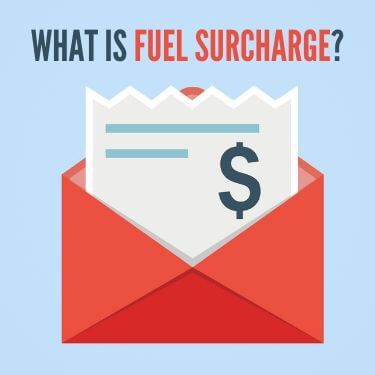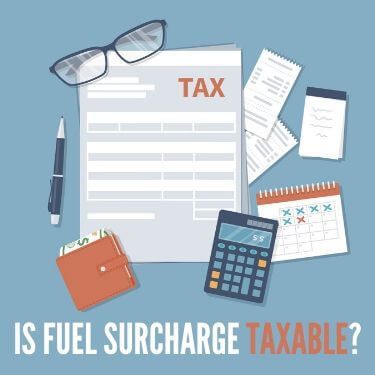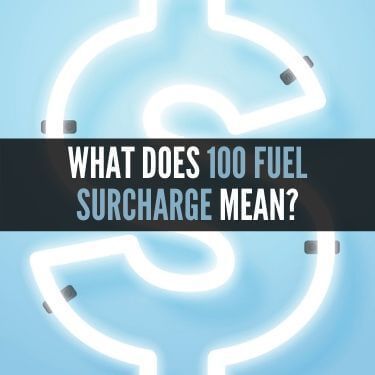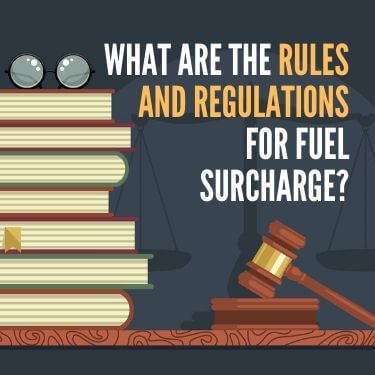Understanding truckload fuel surcharge is an important detail to know when shipping freight. Not being familiar with how it works, what it should cost, and more can lead to confusion and frustration. While most freight carriers will provide you with accurate and honest information, it doesn’t hurt to have the knowledge in advance.
All freight carriers in the U.S. impose truckload fuel surcharge according to their own rate table. Carriers also vary in terms of how they calculate their fuel surcharge rates. While the amount will vary from company to company, all companies use the average price of fuel which is set by the EIA.
To better understand fuel surcharge, we’ve compiled and answered 8 of the most commonly asked questions surrounding it. When you’re finished reading the article, you’ll have a complete understanding of fuel surcharge
Before we can explain what kinds of surcharge costs you may incur for shipping freight, let’s start with a definition of fuel surcharge. A fuel surcharge is an additional fee added to freight shipments when the cost of fuel exceeds the current average. According to the EIA, a fuel surcharge is designed for freight carriers, delivery companies, and shippers as a means of reimbursing the carrier for the cost of the fuel they must expend to ship the item.
The EIA mentions that it’s up to a company to determine the way they’ll set up their fuel charges. While we’ll talk about the methods for calculating this surcharge in the next section, know for now there’s more than one way to go about it. The EIA mentions there’s not necessarily one more superior method over another, and they certainly don’t endorse any one calculation method.
Since you’re a shipper, you will pay the truckload fuel surcharge to other parties like carriers, freight forwarders, and freight brokers. This payment helps drivers cover fluctuations in the cost of fuel. You do have to keep in mind when making payments that these surcharges are not a static thing. They will fluctuate as fuel prices do, increasing more at times and then decreasing in others.

To calculate the fuel surcharge then, make sure it’s based on the national diesel fuel price and the average mile per gallon each of the freight vehicles gets. This does accommodate for diesel fuel price fluctuations. If your carrier goes by precise mileage with your calculation, they’ll ensure you get the exact surcharge down to the last dollar and cent. However, this also requires more effort on the part of the carrier, as they have to make a log for each freight trip. This prevents information overlap.
As we said in the prior section, there’s more than one way to calculate a fuel surcharge. However, one common characteristic among all carriers is that the calculation goes into effect when a load is picked up to the time when the load is delivered.
When booking a load with a carrier, it’s helpful to know the different ways in which fuel surcharge is calculated. Knowing how the carrier calculates the fuel surcharge gives you the ability to verify that the charge is accurate. Listed below are the different ways that fuel surcharge is calculated.
If this all sounds a little too confusing, then we recommend trying a fuel surcharge calculator first, such as this one from Owner-Operator Independent Drivers Association (OOIDA). Their calculator lets you determine the surcharge without having to do a lot of the math yourself.
To get started, you want to input the fuel cost baseline. Next, add your average miles per gallon and your average diesel fuel price. Just like that, you get the surcharge. You can even download the calculator as an app for use on Blackberry and Android phones. That can come quite in handy until you get more comfortable calculating the fuel surcharge manually.
Fuel surcharges aren't the only fees you might find on your carrier's bill. Learn more about truckload accessorial charges.
Another question you might have is whether a fuel surcharge is taxable. While not exclusively true, yes, in most instances, it is taxable. The first type of tax you could incur is income tax. Since this is a form of revenue, it’s taxable in most parts of the US, at least according to the Internal Revenue Service (IRS).
As a shipper/receiver, when you receive a freight invoice, the total amount included as tax will include the freight surcharge. This makes sense since tax is charged when the fuel is purchased, tax is also applied when the shipper or receiver is given the invoice.

If you’re calculating a fuel surcharge for the first time, then we recommend you look at the current trucking surcharges so you’re sure your bill is within the correct range. These are available through the EIA’s Gasoline and Diesel Fuel Update, which adds new data every week. The update covers all the costs of gasoline and diesel fuel in the US. The EIA even dives deeper into how they get this data, breaking down fuel costs by crude oil, refining, marketing and distribution, and taxes for both diesel fuel and gasoline.
According to data from August 2019, the average price for diesel is $3.01 a gallon. Having access to and using this tool will allow you to be in the loop and what the true current price of fuel is. It’s worth noting that the EIA breaks down an average cost both nationally and regionally. Again, some trucking companies will use the national average, while other will use regional averages if they’re driving in one of the specific regions.
Listed below are the different regions that the EIA uses.
Let’s say you see an invoice that mentions something about a 100 fuel surcharge. You may wonder, what does that even mean?
Here’s how it works. When you pay the surcharge for diesel fuel, it goes to either the broker or the driver as part of the carrier company. Thus, when the carrier mentions a 100 fuel surcharge, what they’re talking about is that the entirety of the surcharge should be allocated to the driver. In other words, the driver or carrier gets the full amount of the surcharge that’s collected.
If you’re still confused, that’s okay. It is something that’s brought up from time to time, but at the end of the day, a 100 fuel surcharge just has to do with how the fuel surcharge is allocated. It doesn’t affect how much you pay as the shipper. Also, no, it doesn’t mean you’re paying extra for the surcharge.

Back in 2005, the U.S. House of Representatives opted to set into place a rule that truckload surcharges would be mandatory. Freight forwarders, brokers, and carriers that didn't cover the costs of fuel they used could charge for this fuel as a surcharge. The surcharge would go to whichever party should have paid for the fuel. This doesn't really affect shippers.
The smallest surcharge limit per the 2005 bill is the average fuel cost subtracted by your benchmark costs. Then, multiply that by the diesel fuel gallons. When the average price of diesel exceeds that of the average benchmark price, then the surcharge should be put into play. It’s only when diesel fuel drops below the benchmark that the surcharge would not be included.
Interestingly, the bill says that if you have a pre-existing agreement or contract with your own cost adjustments or surcharge for fuel, there’d be no need for this to be mandatory. Otherwise, it must be.
With truckload fuel surcharge being guided by the EIA, it’s expected that there are some rules and regulations surrounding it.. There is one such rule here called the Pass-Through of Motor Carrier Fuel Surcharge Adjustment to the Cost Bearer.
What does this one mean? Here’s an explanation: If a freight carrier, broker, or forwarder contracts a shipment to an owner-operator, it’s required that the owner-operator be reimbursed for the cost of fuel used during the shipment. Again, this doesn’t affect you as the shipper. This is more of a rule governing the financial relationship between owner-operators and carriers, brokers, and forwarders.
What about any other rules, like for which method to use when calculating surcharges and how much to charge? This area is surprisingly unregulated. Remember, even the EIA doesn’t make or endorse any methods for calculating surcharges. They post their information weekly and that’s it. It’s a guideline, but it doesn’t mean the rules can’t be twisted or manipulated.

Let’s say you want to negotiate fuel surcharge costs. Can you? Should you? That’s up to you and the carrier to decide. With so many methods for calculating the surcharges, there’s no one universal rate at which to charge. After all, as you remember, diesel fuel prices can fluctuate. Keeping all that information in mind, it would seem there’s room for negotiation.
If you do decide to negotiate on surcharge prices with the carrier, then once again, you want to make sure you’re not short-changing your carrier. It’s not cheap by any means to bring your freight to its destination, especially if it’s across a country or even over country lines.
We recommend considering a long-term contract or a fuel tax. You may pay more initially on this tax, but sometimes the carrier will lessen the surcharge. Some even eliminate the surcharge altogether, which saves you money. If you are locking into a long-term contract, you have to ensure it’s going to be financially feasible for you over the next several years. If the prices of diesel go up, you don’t want to find yourself in over your head with the surcharge and carrier bills.
If your shipping company is seeking a freight carrier service, trust in us at R+L Global Logistics. Our company specializes in a slew of industries, including franchises, industrial and engineering, chemicals, medical, life science, consumer goods, and global technology.
No matter where you're shipping, we can help get your freight there. We specialize in common trucking lanes, like cross country freight shipping from California to Florida and even routes for freight shipping from Texas to Idaho. We specialize in services including truckload shipping, expedited freight and refrigerated shipping.
Both our carrier and shipping services are unmatched. We offer international shipping, including customs brokerage and air charters as well as domestic shipping by the truckload.
When you’re ready to ship freight or have questions for us, give us a call at (866) 353-7178.
R+L Global Logistics
315 NE 14th St., Ocala, FL 34470